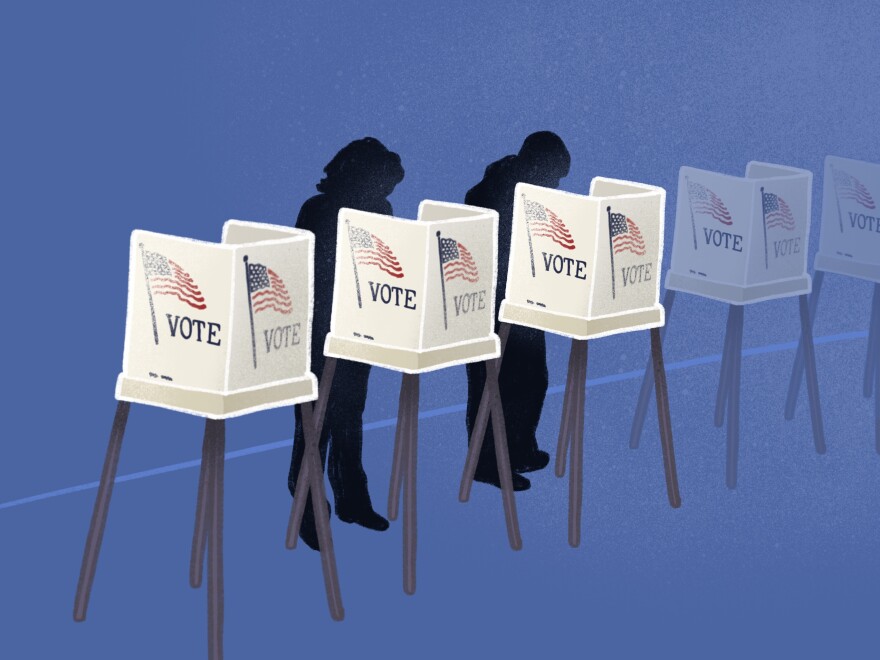Absentee voting is already underway for Missouri’s presidential primary on March 10.
But it’s unclear how much attention the primary will receive from candidates or voters. Or how important Missouri’s votes will be in choosing the two major parties’ nominees.
Would-be voters in Missouri have until Feb. 12 to register.
Still, amid those questions, the state is seeing some early record-setting spending. Former New York Mayor Michael Bloomberg, a billionaire Democrat, has already spent more than $4 million in Missouri on TV ads, according to a political ad-buying firm in the state.
Documents filed with the Federal Communications Commission show that Bloomberg’s TV ad campaign spending is averaging a little over $116,000 a week on St. Louis TV stations. That’s unprecedented for a presidential primary election in Missouri.
“Bloomberg is either an idiot or a genius,’’ said former state GOP party Chairman John Hancock, now a Republican consultant. Hancock maintains that President Donald Trump — who carried Missouri by almost 19 points in 2016 — is on track to handily win the state this fall.
That’s why “Bloomberg’s spending is a big surprise to me,’’ Hancock added.
Bloomberg’s campaign in Missouri is particularly stunning, since most other Democratic presidential contenders have spent little or nothing in the state so far. But Missouri Democratic Party Executive Director Lauren Gepford said at least three of her party’s contenders now have campaign staff in the state, and she predicts more will soon follow.
“Missouri has the third-most delegates of all the presidential contests on March 10,” she said, “so we expect an influx of organizing and attention, especially if it is still competitive” after the early primary states.
Bloomberg spokeswoman Amanda Galloway said his spending in Missouri reflects his plans to campaign all over the country.
“Mike’s investment is not just about advertising,” she said. “We currently have five campaign offices in Missouri and over 30 employees who are meeting with voters throughout the state. We currently have close to 40 events planned for the next few weeks in cities and small towns.”
Ballots are set
All told, five different president primary ballots will be available to Missouri voters. Besides the Democratic and Republican parties, voters also can select a presidential primary ballot for the Libertarian, Green or Constitution parties.
Minnesota Sen. Amy Klobuchar will lead the 22 Democrats listed as competing in the Missouri primary. Filing ended Dec. 24. Two others, including California Sen. Kamala Harris, have formally removed themselves from the ballot. Rep. Julian Castro of Texas remains on Missouri’s candidate list, although he officially dropped out weeks ago.
Gepford said the March 10 primary results will determine which candidates snag 68 of Missouri’s 78 Democratic delegates.
That’s where things could get interesting, said Eric Fey, St. Louis County Democratic elections director.
Because Trump is expected to handily defeat his four Missouri primary opponents, “Will Republicans stay home, or will they cross over into the Democratic primary?’’ Fey said. “That’s the election-night story, I think.”
Missouri’s preference primary is unusual. It’s an “open primary,’’ meaning voters can choose which party’s ballot to take, and they don’t need to be a registered member of a party. Many other states, including Illinois, restrict their presidential primaries to voters who declare their party affiliation.
That open-primary status is a key reason why the state’s Republicans determined years ago that their presidential primary is not binding on how the GOP delegates are doled out. Hancock said that fact won’t be an issue anyway, because “Trump will get all our delegates.”
Still, Gepford doesn’t expect to see many Missouri Republicans cross over to cast Democratic presidential ballots.
The lack of GOP campaigning, at least for now, is among the reasons why many activists predict that Missouri’s March 10 turnout will be below the 2016 level, when 1.6 million voters showed up statewide. The bulk of the ballots cast that year were in the Republican primary, a fact that foreshadowed the GOP’s strong showing in the state that fall.
Gepford said that she’s confident this year will be different, and that the results will signal Missouri can regain its old swing-state status.
Hancock said that’s wishful thinking. “Missouri’s like the old gray mare – she ain’t what she used to be,’’ he quipped.
Following the money
For all the state’s presumed GOP leanings, Missouri donors appear to prefer Democrats when it comes to their dollars going to presidential candidates.
As of late December, Trump has raised the most in Missouri — $578,651 — according to the nonpartisan Center for Responsive Politics, which tracks campaign donations, primarily for federal candidates.
But as a bloc, his major Democratic rivals have collected far more in the state.
Vermont Sen. Bernie Sanders has raised $511,228 in Missouri, by far the most for Democratic candidates. Former South Bend, Indiana, Mayor Pete Buttigieg has collected $346,742, followed closely by Massachusetts Sen. Elizabeth Warren, who has raised $337,129. Former Vice President Joe Biden rounds out the state’s top five presidential money-raisers with $231,505.
Overall, the four top Democratic contenders have raised just over $1.4 million in Missouri — almost three times Trump’s tally.
Follow Jo Mannies on Twitter:@jmannies
Send questions and comments about this story to feedback@stlpublicradio.org



